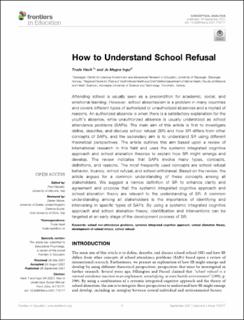| dc.contributor.author | Havik, Trude | |
| dc.contributor.author | Ingul, Jo Magne | |
| dc.date.accessioned | 2021-10-15T09:04:16Z | |
| dc.date.available | 2021-10-15T09:04:16Z | |
| dc.date.created | 2021-09-13T11:19:35Z | |
| dc.date.issued | 2021-09 | |
| dc.identifier.citation | Havik, T., Ingul, J.M. (2021) How to Understand School Refusal. Frontiers in Education, 6 | en_US |
| dc.identifier.issn | 2504-284X | |
| dc.identifier.uri | https://hdl.handle.net/11250/2823234 | |
| dc.description.abstract | Attending school is usually seen as a precondition for academic, social, and emotional learning. However, school absenteeism is a problem in many countries and covers different types of authorized or unauthorized absences and a myriad of reasons. An authorized absence is when there is a satisfactory explanation for the youth’s absence, while unauthorized absence is usually understood as school attendance problems (SAPs). The main aim of this article is first to investigate define, describe, and discuss school refusal (SR) and how SR differs from other concepts of SAPs, and the secondary aim is to understand SR using different theoretical perspectives. The article outlines this aim based upon a review of international research in this field and uses the systemic integrated cognitive approach and school alienation theories to explain how SR might emerge and develop. The review indicates that SAPs involve many types, concepts, definitions, and reasons. The most frequently used concepts are school refusal behavior, truancy, school refusal, and school withdrawal. Based on the review, the article argues for a common understanding of these concepts among all stakeholders. We suggest a narrow definition of SR to enhance clarity and agreement and propose that the systemic integrated cognitive approach and school alienation theory are relevant to the understanding of SR. A common understanding among all stakeholders is the importance of identifying and intervening in specific types of SAPs. By using a systemic integrated cognitive approach and school alienation theory, identification and interventions can be targeted at an early stage of the development process of SR. | en_US |
| dc.language.iso | eng | en_US |
| dc.publisher | Frontiers Media S.A | en_US |
| dc.rights | Attribution-NonCommercial-NoDerivatives 4.0 Internasjonal | * |
| dc.rights.uri | http://creativecommons.org/licenses/by-nc-nd/4.0/deed.no | * |
| dc.subject | utdanningsvitenskap | en_US |
| dc.subject | psykologi | en_US |
| dc.subject | skolevegring | en_US |
| dc.title | How to Understand School Refusal | en_US |
| dc.type | Peer reviewed | en_US |
| dc.type | Journal article | en_US |
| dc.description.version | publishedVersion | en_US |
| dc.rights.holder | © The Author(s) 2021 | en_US |
| dc.subject.nsi | VDP::Samfunnsvitenskap: 200::Pedagogiske fag: 280 | en_US |
| dc.source.volume | 6 | en_US |
| dc.source.journal | Frontiers in Education | en_US |
| dc.identifier.doi | 10.3389/feduc.2021.715177 | |
| dc.identifier.cristin | 1933691 | |
| dc.source.articlenumber | 715177 | en_US |
| cristin.ispublished | true | |
| cristin.fulltext | original | |
| cristin.qualitycode | 1 | |

